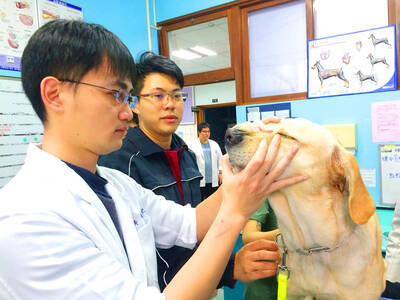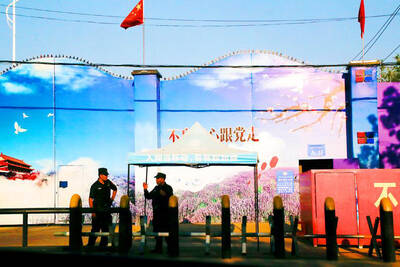Academia Sinica researcher and Sunflower movement leader Huang Kuo-chang (黃國昌) yesterday announced his decision to become a member of the New Power Party (NPP), urging more young people to join the political party launched in January by prominent social activists.
Huang, who played a central role in the Sunflower movement protests last year, told a news conference in Taipei that he remained undecided over whether to enter next year’s legislative contest.
He said that he was considering an NPP candidacy in two constituencies: Taipei’s District 4, covering Neihu (內湖) and Nangang (南港) districts; or New Taipei City’s District 12, covering Sijhih District (汐止) and six others along the nation’s northeastern coast.
Saying that grassroots organizations from both constituencies have contacted him to encourage him to join the race, Huang remained tight-lipped about a final decision, saying that it was very difficult for him to terminate his career in academia.
He ruled out being listed as a legislator-at-large candidate for the NPP.
Huang also dismissed media speculation that he might replace NPP legislative candidate Hu Po-yen (胡博硯) in New Taipei City’s Yonghe (永和) and Zhonghe (中和) districts.
On Tuesday last week, Hu announced his decision to withdraw from the race, but deleted the post from Facebook about 30 minutes later.
In the deleted post, Hu said he was willing to make way for Huang in his legislative bid to oust Chinese Nationalist Party (KMT) Legislator Chang Ching-chung (張慶忠), who gained notoriety after his attempt last year to ram a proposed trade pact with China through the legislature, which triggered the Sunflower movement.
According to a report by the Chinese-language news site Storm Media, Democratic Progressive Party (DPP) members in Yonghe were more willing to support Huang’s candidacy, as they consider Hu a weaker candidate.
Huang yesterday said that it was not up to the DPP to decide where he should run for legislator.
The nation needs “a second pro-localization party as a vehicle of progressive values to speed up the process of eliminating the KMT, and to maintain a relationship of constructive competition with the DPP,” Huang said.
In other developments yesterday, several NPP legislative candidates expressed their commitment to staying in the race despite mounting pressure from the DPP and rival minor parties founded by social activists.
NPP legislative candidate Chiu Hsien-chih (邱顯智) expressed his misgivings about his prospective rival in Hsinchu City, DPP caucus whip Ker Chien-ming (柯建銘), saying Ker’s record in the legislature went against the NPP’s beliefs in political transparency.
“The problem is that we are no longer able to find stimulating discussions in parliament, because they have been replaced by intra-party caucus negotiations,” Chiu said. “We can say that caucus negotiations have eviscerated the true spirit of representational politics.”
“We encountered discrepancies in terms of our fundamental values with the KMT’s [Legislative Speaker] Wang Jin-pyng (王金平) or Ker, so it is not like we have anything against him personally,” he added, reiterating his decision to continue his campaign as long as Ker represented the DPP.
NPP candidate author Neil Peng (馮光遠) called for televised debates between himself and any prospective DPP candidates in New Taipei City’s District 1, which covers the districts of Tamsui (淡水), Sanjhih (三芝), Shihmen (石門), Bali (八里), Taishan (泰山) and Linkou (林口).
Peng said that televised debates should take place before any opinion polls are conducted to decide which party backs out of the race.
He added that NPP candidates are severely disadvantaged due to a lack of campaign funding compared with members of the DPP and KMT incumbent Wu Yu-sheng (吳育昇).
Also yesterday, NPP founder Freddy Lim (林昶佐) said the party is willing to cooperate with other political parties on legislator-at-large nomination strategies — such as formulating a joint nomination list with the Social Democratic Party and the Green Party.

Former Czech Republic-based Taiwanese researcher Cheng Yu-chin (鄭宇欽) has been sentenced to seven years in prison on espionage-related charges, China’s Ministry of State Security announced yesterday. China said Cheng was a spy for Taiwan who “masqueraded as a professor” and that he was previously an assistant to former Cabinet secretary-general Cho Jung-tai (卓榮泰). President-elect William Lai (賴清德) on Wednesday last week announced Cho would be his premier when Lai is inaugurated next month. Today is China’s “National Security Education Day.” The Chinese ministry yesterday released a video online showing arrests over the past 10 years of people alleged to be

THE HAWAII FACTOR: While a 1965 opinion said an attack on Hawaii would not trigger Article 5, the text of the treaty suggests the state is covered, the report says NATO could be drawn into a conflict in the Taiwan Strait if Chinese forces attacked the US mainland or Hawaii, a NATO Defense College report published on Monday says. The report, written by James Lee, an assistant research fellow at Academia Sinica’s Institute of European and American Studies, states that under certain conditions a Taiwan contingency could trigger Article 5 of NATO, under which an attack against any member of the alliance is considered an attack against all members, necessitating a response. Article 6 of the North Atlantic Treaty specifies that an armed attack in the territory of any member in Europe,

LIKE FAMILY: People now treat dogs and cats as family members. They receive the same medical treatments and tests as humans do, a veterinary association official said The number of pet dogs and cats in Taiwan has officially outnumbered the number of human newborns last year, data from the Ministry of Agriculture’s pet registration information system showed. As of last year, Taiwan had 94,544 registered pet dogs and 137,652 pet cats, the data showed. By contrast, 135,571 babies were born last year. Demand for medical care for pet animals has also risen. As of Feb. 29, there were 5,773 veterinarians in Taiwan, 3,993 of whom were for pet animals, statistics from the Animal and Plant Health Inspection Agency showed. In 2022, the nation had 3,077 pediatricians. As of last

XINJIANG: Officials are conducting a report into amending an existing law or to enact a special law to prohibit goods using forced labor Taiwan is mulling an amendment prohibiting the importation of goods using forced labor, similar to the Uyghur Forced Labor Prevention Act (UFLPA) passed by the US Congress in 2021 that imposed limits on goods produced using forced labor in China’s Xinjiang region. A government official who wished to remain anonymous said yesterday that as the US customs law explicitly prohibits the importation of goods made using forced labor, in 2021 it passed the specialized UFLPA to limit the importation of cotton and other goods from China’s Xinjiang Uyghur region. Taiwan does not have the legal basis to prohibit the importation of goods